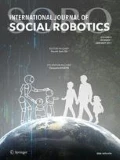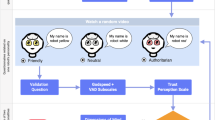Abstract
With the rise of integration of robots in our daily lives, people find their own ways of normalizing their interaction with artificial agents, one of which is attributing mind to them. Research has shown that attributing mind to an artificial agent improves the flow of the interaction and alters behavior following it. However, little is known about the the influence of the interaction context and the outcome of the interaction. Addressing this gap in the literature, we explored the influence of the Interaction Context (cooperation vs. competition) and Outcome (win vs. lose) on the attributed levels of mind to an artificial agent. To that end, we used an interactive game that consisted of trivia questions between teams of human participants and the robot Cozmo. We found that in the cooperation condition, those who lost as a team ascribed greater levels of mind to the agent compared to those who won as a team. However, participants who competed with and won against the robot attributed greater levels of mind to the agent compared to those who cooperated and won as a team. These results suggest that people attribute mind to artificial agents in a self-serving way, depending on the interaction context and outcome.






Similar content being viewed by others
References
Mutlu B, Osman S, Forlizzi J, Hodgins J, Kiesler S (2006) Task structure and user attributes as elements of human-robot interaction design. In: ROMAN 2006—The 15th IEEE international symposium on robot and human interactive communication. IEEE, pp 74–79
Dennett DC (1996) The science masters series. Kinds of minds: Toward an understanding of consciousness. Basic Books, New York, NY
Heider F, Simmel M (1944) An experimental study of apparent behavior. Am J Psychol 57:243–259
Waytz A, Gray K, Epley N, Wegner DM (2010) Causes and consequences of mind perception. Trends Cognit Sci 14(8):383–388
Barrett J, Johnson AH (2003) The role of control in attributing intentional agency to inanimate objects. J Cognit Cult 3(3):208–217
Wiese E, Metta G, Wykowska A (2017) Robots as intentional agents: using neuroscientific methods to make robots appear more social. Front Psychol 8:1663
Gray HM, Gray K, Wegner DM (2007) Dimensions of mind perception. Science 315(5812):619
Epley N, Waytz A (2010) Mind perception. Handbook of social psychology
Broadbent E (2017) Interactions with robots: the truths we reveal about ourselves. Annu Rev Psychol 68:627–652
Martini MC, Gonzalez CA, Wiese E (2016) Seeing minds in others—can agents with robotic appearance have human-like preferences? PLoS ONE 11(1):e0146310. https://doi.org/10.1371/journal.pone.0146310
Morewedge CK, Preston J, Wegner DM (2007) Timescale bias in the attribution of mind. J Pers Soc Psychol 93(1):1
Ward AF, Olsen AS, Wegner DM (2013) The harm-made mind: observing victimization augments attribution of minds to vegetative patients, robots, and the dead. Psychol Sci 24(8):1437–1445
de Bruijn ER, de Lange FP, von Cramon DY, Ullsperger M (2009) When errors are rewarding. J Neurosci 29(39):12183–12186
Ruys KI, Aarts H (2010) When competition merges people’s behavior: interdependency activates shared action representations. J Exp Soc Psychol 46(6):1130–1133
Kim Y, Mutlu B (2014) How social distance shapes human–robot interaction. Int J Hum Comput Stud 72(12):783–795
Vilaza GN, Haselager WFF, Campos AMC, Vuurpijl L (2014) Using games to investigate sense of agency and attribution of responsibility. In: Proceedings of the 2014 SBGames (SBgames 2014), SBC, Porte Alegre
Brislin RW (1970) Back-translation for cross-cultural research. J Cross Cult Psychol 1(3):185–216
Lefkeli D, Akgun B, Omar S, Malik A, Canli ZG and Eskenazi T (2018) Mind in the machine: perceived minds induce decision change. arXiv preprint arXiv:1811.00876
Wang X, Krumhuber EG (2018) Mind perception of robots varies with their economic versus social function. Front Psychol 9:1230
Waytz A, Cacioppo J, Epley N (2010) Who sees human? The stability and importance of individual differences in anthropomorphism. Perspect Psychol Sci 5(3):219–232
Nomura T, Suzuki T, Kanda T, Kato K (2006) Measurement of negative attitudes toward robots. Interact Stud 7(3):437–454
Marchesi S, Ghiglino D, Ciardo F, Baykara E, Wykowska A (2019) Do we adopt the Intentional Stance towards humanoid robots? Front Psychol 10:450
Forsyth DR (2008) Self-serving bias. In: Darity WA (eds) International encyclopedia of the social sciences, 2nd ed, vol 7. Detroit: Macmillan Reference USA
Ciardo F, Beyer F, De Tommaso D, Wykowska A (2020) Attribution of intentional agency towards robots reduces one’s own sense of agency. Cognition 194:104109
Epley N, Eyal T (2019) Through a looking glass, darkly: using mechanisms of mind perception to identify accuracy, overconfidence, and underappreciated means for improvement. Adv Exp Soc Psychol 60:65–120
Author information
Authors and Affiliations
Corresponding author
Additional information
Publisher's Note
Springer Nature remains neutral with regard to jurisdictional claims in published maps and institutional affiliations.
Appendices
Appendix 1
Mental Capacities
-
Communication This survey asks you to judge which character is more capable of conveying thoughts or feelings to others.
-
Consciousness This survey asks you to judge which character is more capable of having experiences and being aware of things.
-
Desire This survey asks you to judge which character is more capable of longing or hoping for things.
-
Embarrassment This survey asks you to judge which character is more capable of Experiencing embarrassment.
-
Emotion recognition This survey asks you to judge which character is more capable of understanding how others are feeling.
-
Fear This survey asks you to judge which character is more capable of feeling afraid or fearful.
-
Hunger This survey asks you to judge which character is more capable of feeling hungry.
-
Joy This survey asks you to judge which character is more capable of experiencing joy.
-
Memory This survey asks you to judge which character is more capable of remembering things.
-
Morality This survey asks you to judge which character is more capable of telling right from wrong and trying to do the right thing.
-
Pain This survey asks you to judge which character is more capable of experiencing physical or emotional pain.
-
Personality This survey asks you to judge which character is more capable of having personality traits that make it unique from others.
-
Planning This survey asks you to judge which character is more capable of making plans and working toward goal.
-
Pleasure This survey asks you to judge which character is more capable of experiencing physical or emotional pleasure.
-
Pride This survey asks you to judge which character is more capable of experiencing pride.
-
Rage This survey asks you to judge which character is more capable of experiencing violent or uncontrolled anger.
-
Self control This survey asks you to judge which character is more capable of exercising self-restraint over desires, emotions, or impulses.
-
Thought This survey asks you to judge which character is more capable of thinking.
Appendix 2
-
1.
To what extent did you feel as if Cozmo was capable of conveying thoughts to others?
-
2.
To what extent did you feel as if Cozmo was capable of conveying feelings to others?
-
3.
To what extent did you feel as if Cozmo was capable of having experiences?
-
4.
To what extent did you feel as if Cozmo was capable of being aware of things?
-
5.
To what extent did you feel as if Cozmo was capable of longing for things?
-
6.
To what extent did you feel as if Cozmo was capable of hoping for things?
-
7.
To what extent did you feel as if Cozmo was capable of experiencing embarrassment?
-
8.
To what extent did you feel as if Cozmo was capable of understanding how others are feeling?
-
9.
To what extent did you feel as if Cozmo was capable of feeling afraid?
-
10.
To what extent did you feel as if Cozmo was capable of feeling hungry?
-
11.
To what extent did you feel as if Cozmo was capable of experiencing joy?
-
12.
To what extent did you feel as if Cozmo was capable of remembering things?
-
13.
To what extent did you feel as if Cozmo was capable of telling right from wrong?
-
14.
To what extent did you feel as if Cozmo was capable of trying to do the right thing?
-
15.
To what extent did you feel as if is Cozmo was capable of experiencing physical pain?
-
16.
To what extent did you feel as if Cozmo was capable of experiencing emotional pain?
-
17.
To what extent did you feel as if Cozmo was capable of having personality traits that make it unique from others?
-
18.
To what extent did you feel as if Cozmo was capable of making plans?
-
19.
To what extent did you feel as if Cozmo was capable of working toward goals?
-
20.
To what extent did you feel as if Cozmo was capable of experiencing physical pleasure?
-
21.
To what extent did you feel as if Cozmo was capable of experiencing emotional pleasure?
-
22.
To what extent did you feel as if Cozmo was capable of experiencing pride?
-
23.
To what extent did you feel as if Cozmo was capable of being violent?
-
24.
To what extent did you feel as if Cozmo was capable of experiencing uncontrolled anger?
-
25.
To what extent did you feel as if Cozmo was capable of exercising self-restraint over desires?
-
26.
To what extent did you feel as if Cozmo was capable of exercising self-restraint over emotions?
-
27.
To what extent did you feel as if Cozmo was capable of exercising self-restraint over impulses?
-
28.
To what extent did you feel as if Cozmo was capable of thinking?
Rights and permissions
About this article
Cite this article
Lefkeli, D., Ozbay, Y., Gürhan-Canli, Z. et al. Competing with or Against Cozmo, the Robot: Influence of Interaction Context and Outcome on Mind Perception. Int J of Soc Robotics 13, 715–724 (2021). https://doi.org/10.1007/s12369-020-00668-3
Accepted:
Published:
Issue Date:
DOI: https://doi.org/10.1007/s12369-020-00668-3




